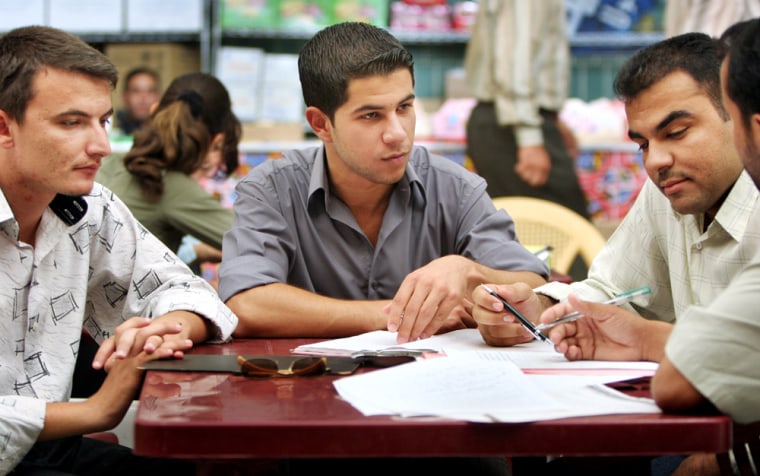Ali Jassim’s parents begged him to take a month off from school after his friend was gunned down as the two men left their university in Baghdad.
He refused, saying it’s important not to let the insurgents win an apparent campaign against students, with at least 36 killed since April.
“We scare the terrorists who do not want progress and development in this country,” the 25-year-old said. “We have had enough suffering.”
The memory of his friend hits hard as students take rigorous final exams, all too aware they could be targeted by insurgents or caught up in one of Iraq’s many bombings and shootings.
“I started hating to study and I don’t feel very good,” Jassim said. “I still remember him. He was in love with a girl... they were supposed to get married in July, after graduation.”
The dangers were driven home last week when masked gunmen stopped two minivans carrying students, rounded up people nearby and killed 21 Shiites after separating them from Sunni Arabs. Two victims were high school students and nine were studying at al-Yarmouk University in Baqouba, 35 miles northeast of the capital.
An electrician who survived said the attackers checked IDs and ordered Shiites to lie on the ground. Before the gunmen opened fire one shouted, “On behalf of Islam, today we will dig a mass grave for you. You are traitors.”
The next day, gunmen in a car killed two Sunni brothers as they were driving to college in Baghdad.
There is no definitive tally of how many students have been killed since the U.S.-led invasion in March 2003, but the violence clearly has taken a toll on Iraq’s education system.
Some students have temporarily left school, some professors have fled the country, and many parents have risked their lives to get their children to and from school.
The Iraqi government stepped up security for schools during final exams in May and June, and students and visitors are being searched. Students can also ask to take exams in safer neighborhoods if they can show they face a threat.
“The gunmen are targeting the students and the professors, but we have to challenge the terrorism,” said Nihad al-Rawi, the president’s assistant at Baghdad University. “Life should go on and so should the studies.”
A grim tally
Associated Press figures show at least 42 university students and 11 elementary and high school students have been killed since April 28, 2005. Thirty-eight teachers, professors, school administrators, school security guards or school bus drivers died in the same period.
The tally indicates there has been a surge of attacks on university students since April — 36 of the 42 reported deaths occurred during that time, and seven students were abducted. Attacks on teachers also were up, with 19 deaths reported since April of this year.
The figures include incidents specifying students that have been reported by the AP; the actual number of deaths is believed to be much higher.
In one case, engineering student Ahmed Abbas, 24, of Baghdad said he was seized by gunmen as he was leaving school in April and held for three weeks until his father paid a $30,000 ransom.
Fearful targets
Many students fear they are attractive targets amid a rise of Islamic extremism and sectarian violence in Iraq, where a tennis coach and one of his players were gunned down for wearing shorts last month.
Luma George, a 20-year-old Christian who is studying to be a teacher, now wears an Islamic headscarf known as a hijab as she is driven to and from school.
“Gunmen threatened to kill us if we did not wear a hijab,” she said, adding that she has had trouble concentrating on final exams because of the violence.
Ali Murad al-Jubouri, a 22-year-old science student, said some of his friends left school. He said he decided to stay, but he and some friends were living in classrooms to avoid using the roads every day.
Killing the future
He said he believed insurgents seeking to block progress in Iraq were targeting students “because they are the educational threads and the country will count on them.”
Jassim, however, had a simpler explanation. “They are Iraqis and every Iraqi is a target,” he said.
Professor Issam al-Rawi, head of the Iraqi Association of University Lecturers, said 220 professors have been killed since the war began and hundreds more have left Iraq after being threatened.
The most recent killing was Tuesday, he said, when Baghdad University professor Hani Jassim al-Duleimi was gunned down in front of his house.
“This violence will set our country back centuries,” al-Rawi said, “We’ll end up with an ignorant generation.”
